Artificial Intelligence Impact on Ascope Shipping Services: Report
VerifiedAdded on 2023/01/11
|12
|3758
|81
Report
AI Summary
This report examines the integration of Artificial Intelligence (AI) within Business Information Systems (BIS), using Ascope Shipping Services Limited as a case study. It begins with a discussion of AI's global characteristics and significance, followed by an evaluation of the opportunities and challenges AI presents to organizations. The report then analyzes how to address AI requirements within Ascope's BIS and business strategy, including an overview of the business, its BIS solution, strategic position, and performance objectives. It explores strategies to address responsibility, trust, bias, fairness, inclusion, and environmental/socio-economic impacts. Finally, the report assesses how these principles contribute to the overall business strategy of Ascope Shipping Services, concluding with a summary of key findings and recommendations.
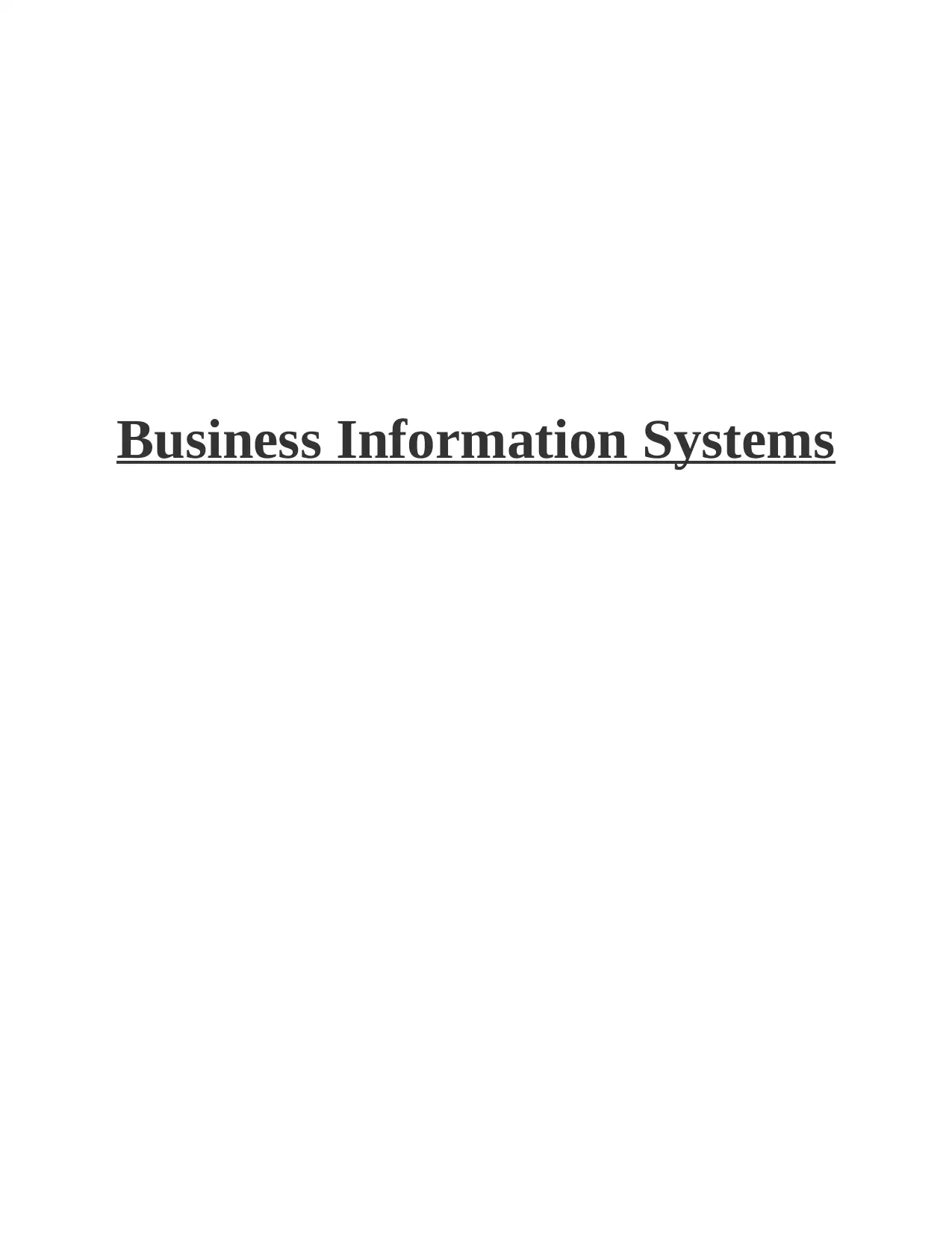
Business Information Systems
Paraphrase This Document
Need a fresh take? Get an instant paraphrase of this document with our AI Paraphraser
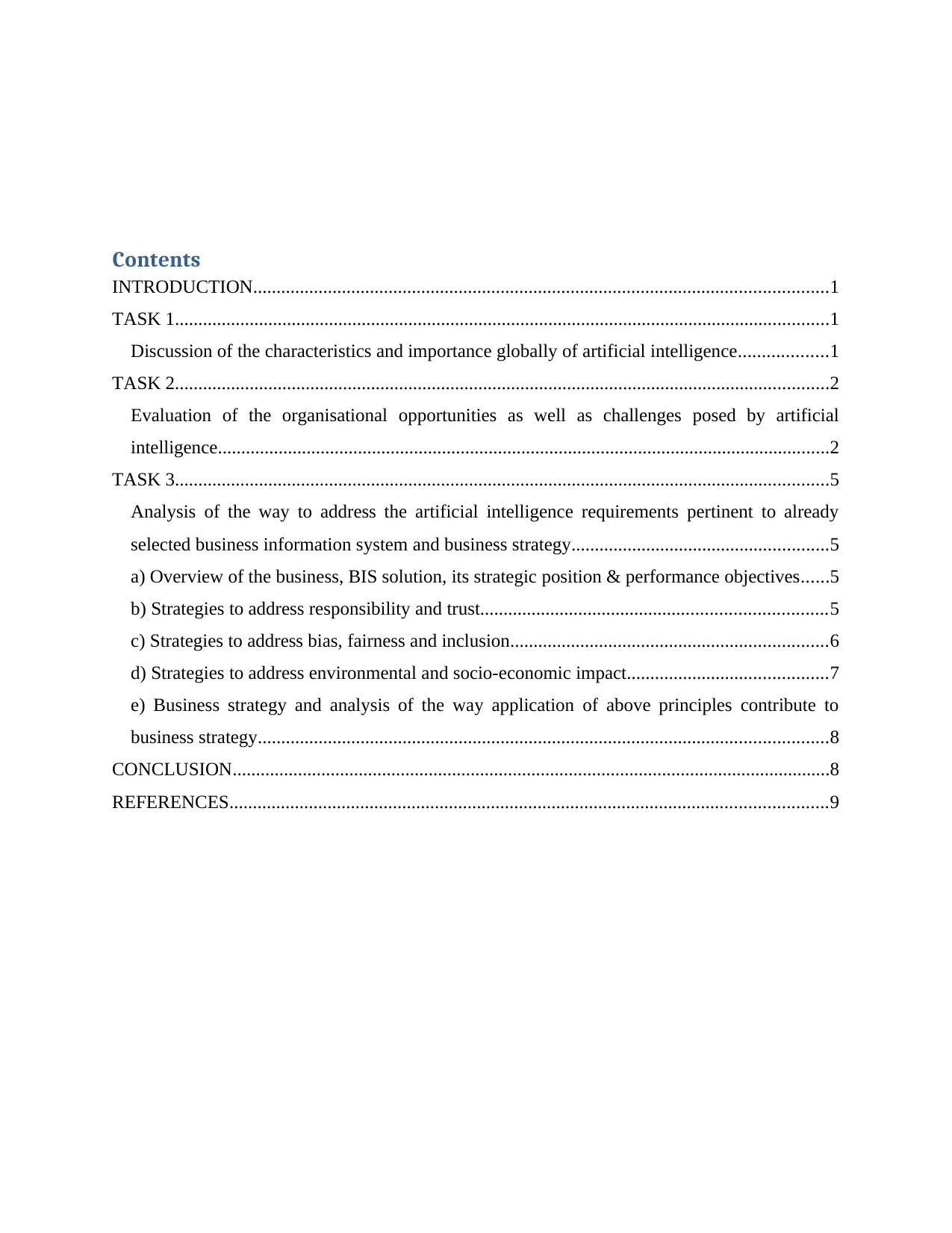
Contents
INTRODUCTION...........................................................................................................................1
TASK 1............................................................................................................................................1
Discussion of the characteristics and importance globally of artificial intelligence...................1
TASK 2............................................................................................................................................2
Evaluation of the organisational opportunities as well as challenges posed by artificial
intelligence...................................................................................................................................2
TASK 3............................................................................................................................................5
Analysis of the way to address the artificial intelligence requirements pertinent to already
selected business information system and business strategy.......................................................5
a) Overview of the business, BIS solution, its strategic position & performance objectives......5
b) Strategies to address responsibility and trust..........................................................................5
c) Strategies to address bias, fairness and inclusion....................................................................6
d) Strategies to address environmental and socio-economic impact...........................................7
e) Business strategy and analysis of the way application of above principles contribute to
business strategy..........................................................................................................................8
CONCLUSION................................................................................................................................8
REFERENCES................................................................................................................................9
INTRODUCTION...........................................................................................................................1
TASK 1............................................................................................................................................1
Discussion of the characteristics and importance globally of artificial intelligence...................1
TASK 2............................................................................................................................................2
Evaluation of the organisational opportunities as well as challenges posed by artificial
intelligence...................................................................................................................................2
TASK 3............................................................................................................................................5
Analysis of the way to address the artificial intelligence requirements pertinent to already
selected business information system and business strategy.......................................................5
a) Overview of the business, BIS solution, its strategic position & performance objectives......5
b) Strategies to address responsibility and trust..........................................................................5
c) Strategies to address bias, fairness and inclusion....................................................................6
d) Strategies to address environmental and socio-economic impact...........................................7
e) Business strategy and analysis of the way application of above principles contribute to
business strategy..........................................................................................................................8
CONCLUSION................................................................................................................................8
REFERENCES................................................................................................................................9

⊘ This is a preview!⊘
Do you want full access?
Subscribe today to unlock all pages.

Trusted by 1+ million students worldwide
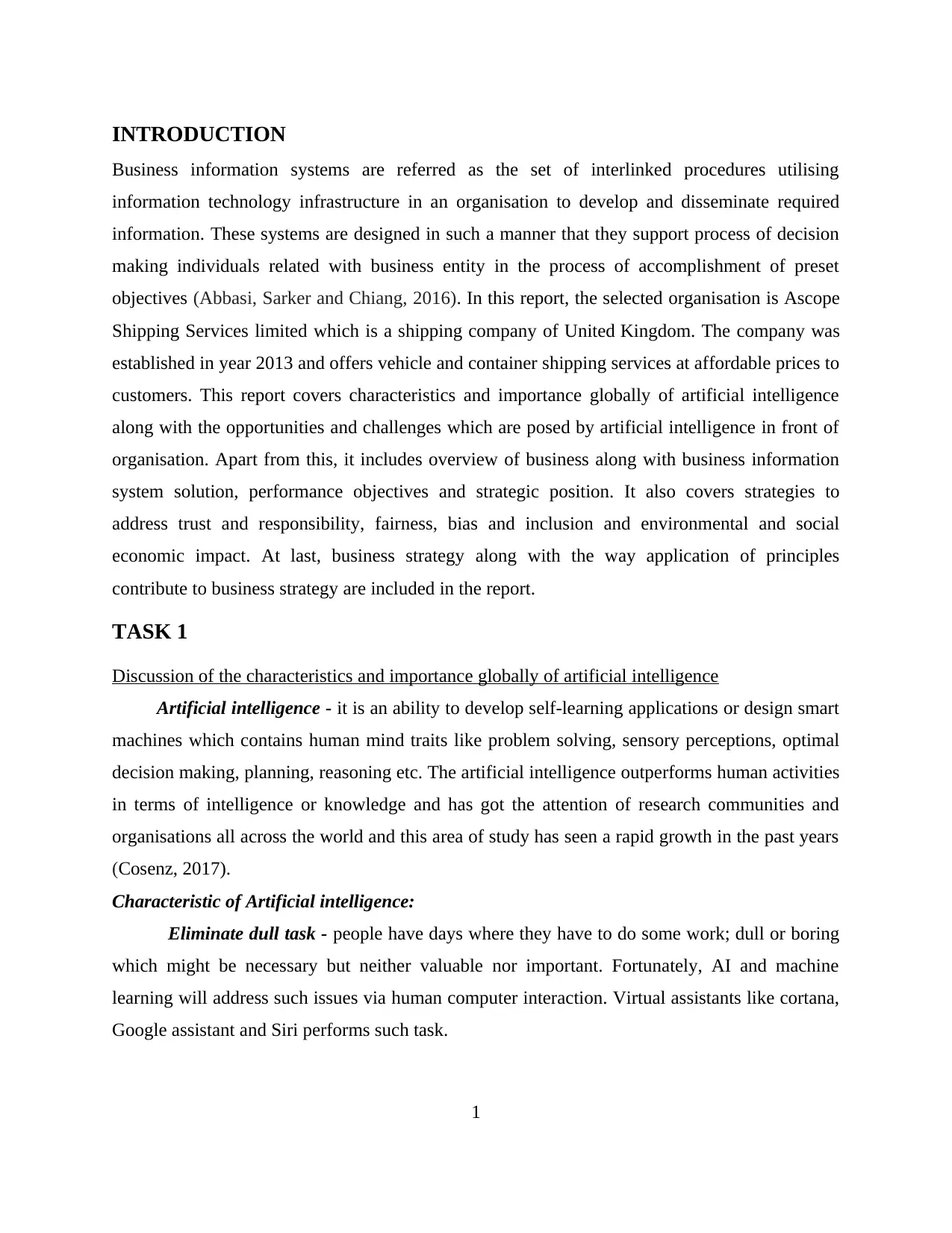
INTRODUCTION
Business information systems are referred as the set of interlinked procedures utilising
information technology infrastructure in an organisation to develop and disseminate required
information. These systems are designed in such a manner that they support process of decision
making individuals related with business entity in the process of accomplishment of preset
objectives (Abbasi, Sarker and Chiang, 2016). In this report, the selected organisation is Ascope
Shipping Services limited which is a shipping company of United Kingdom. The company was
established in year 2013 and offers vehicle and container shipping services at affordable prices to
customers. This report covers characteristics and importance globally of artificial intelligence
along with the opportunities and challenges which are posed by artificial intelligence in front of
organisation. Apart from this, it includes overview of business along with business information
system solution, performance objectives and strategic position. It also covers strategies to
address trust and responsibility, fairness, bias and inclusion and environmental and social
economic impact. At last, business strategy along with the way application of principles
contribute to business strategy are included in the report.
TASK 1
Discussion of the characteristics and importance globally of artificial intelligence
Artificial intelligence - it is an ability to develop self-learning applications or design smart
machines which contains human mind traits like problem solving, sensory perceptions, optimal
decision making, planning, reasoning etc. The artificial intelligence outperforms human activities
in terms of intelligence or knowledge and has got the attention of research communities and
organisations all across the world and this area of study has seen a rapid growth in the past years
(Cosenz, 2017).
Characteristic of Artificial intelligence:
Eliminate dull task - people have days where they have to do some work; dull or boring
which might be necessary but neither valuable nor important. Fortunately, AI and machine
learning will address such issues via human computer interaction. Virtual assistants like cortana,
Google assistant and Siri performs such task.
1
Business information systems are referred as the set of interlinked procedures utilising
information technology infrastructure in an organisation to develop and disseminate required
information. These systems are designed in such a manner that they support process of decision
making individuals related with business entity in the process of accomplishment of preset
objectives (Abbasi, Sarker and Chiang, 2016). In this report, the selected organisation is Ascope
Shipping Services limited which is a shipping company of United Kingdom. The company was
established in year 2013 and offers vehicle and container shipping services at affordable prices to
customers. This report covers characteristics and importance globally of artificial intelligence
along with the opportunities and challenges which are posed by artificial intelligence in front of
organisation. Apart from this, it includes overview of business along with business information
system solution, performance objectives and strategic position. It also covers strategies to
address trust and responsibility, fairness, bias and inclusion and environmental and social
economic impact. At last, business strategy along with the way application of principles
contribute to business strategy are included in the report.
TASK 1
Discussion of the characteristics and importance globally of artificial intelligence
Artificial intelligence - it is an ability to develop self-learning applications or design smart
machines which contains human mind traits like problem solving, sensory perceptions, optimal
decision making, planning, reasoning etc. The artificial intelligence outperforms human activities
in terms of intelligence or knowledge and has got the attention of research communities and
organisations all across the world and this area of study has seen a rapid growth in the past years
(Cosenz, 2017).
Characteristic of Artificial intelligence:
Eliminate dull task - people have days where they have to do some work; dull or boring
which might be necessary but neither valuable nor important. Fortunately, AI and machine
learning will address such issues via human computer interaction. Virtual assistants like cortana,
Google assistant and Siri performs such task.
1
Paraphrase This Document
Need a fresh take? Get an instant paraphrase of this document with our AI Paraphraser
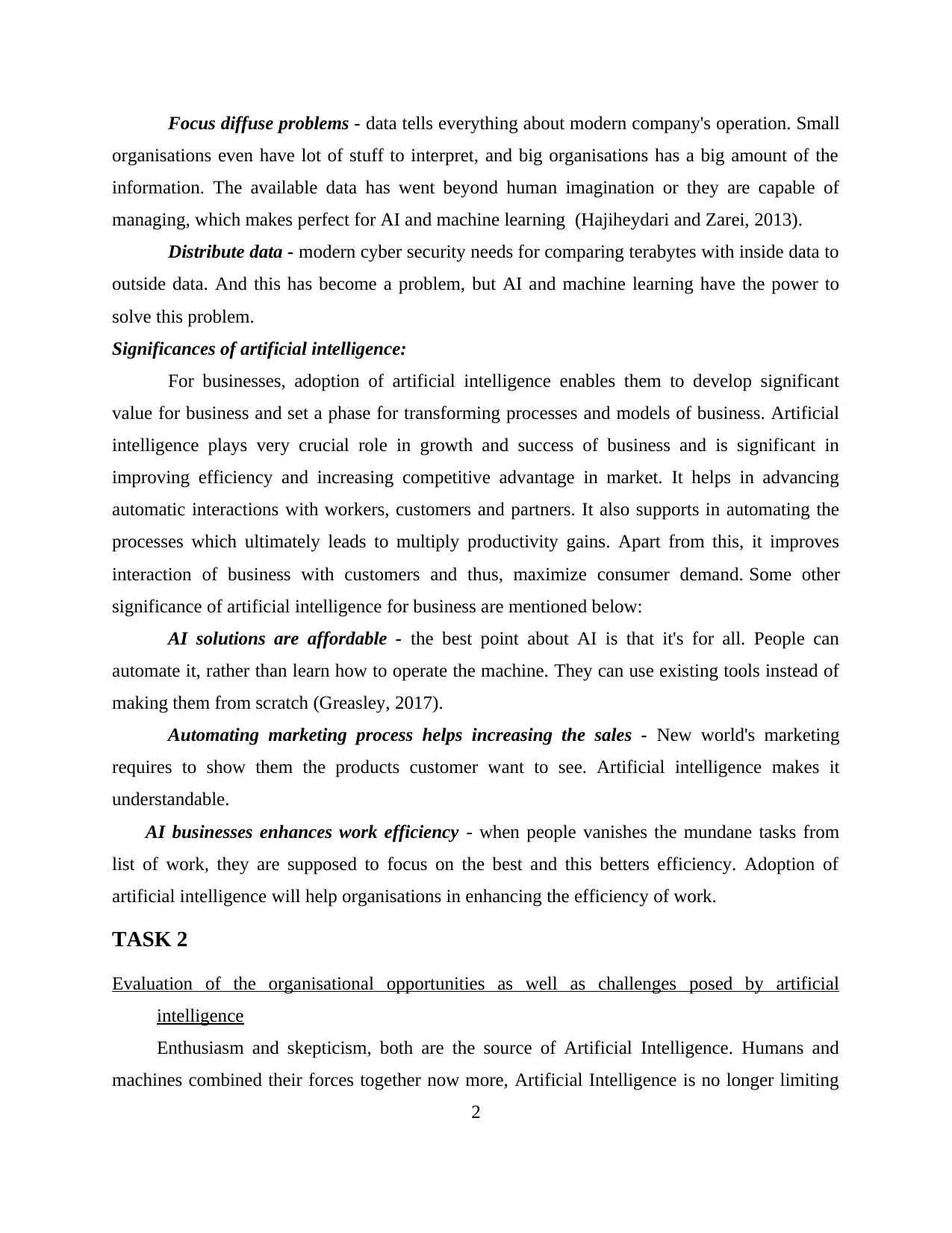
Focus diffuse problems - data tells everything about modern company's operation. Small
organisations even have lot of stuff to interpret, and big organisations has a big amount of the
information. The available data has went beyond human imagination or they are capable of
managing, which makes perfect for AI and machine learning (Hajiheydari and Zarei, 2013).
Distribute data - modern cyber security needs for comparing terabytes with inside data to
outside data. And this has become a problem, but AI and machine learning have the power to
solve this problem.
Significances of artificial intelligence:
For businesses, adoption of artificial intelligence enables them to develop significant
value for business and set a phase for transforming processes and models of business. Artificial
intelligence plays very crucial role in growth and success of business and is significant in
improving efficiency and increasing competitive advantage in market. It helps in advancing
automatic interactions with workers, customers and partners. It also supports in automating the
processes which ultimately leads to multiply productivity gains. Apart from this, it improves
interaction of business with customers and thus, maximize consumer demand. Some other
significance of artificial intelligence for business are mentioned below:
AI solutions are affordable - the best point about AI is that it's for all. People can
automate it, rather than learn how to operate the machine. They can use existing tools instead of
making them from scratch (Greasley, 2017).
Automating marketing process helps increasing the sales - New world's marketing
requires to show them the products customer want to see. Artificial intelligence makes it
understandable.
AI businesses enhances work efficiency - when people vanishes the mundane tasks from
list of work, they are supposed to focus on the best and this betters efficiency. Adoption of
artificial intelligence will help organisations in enhancing the efficiency of work.
TASK 2
Evaluation of the organisational opportunities as well as challenges posed by artificial
intelligence
Enthusiasm and skepticism, both are the source of Artificial Intelligence. Humans and
machines combined their forces together now more, Artificial Intelligence is no longer limiting
2
organisations even have lot of stuff to interpret, and big organisations has a big amount of the
information. The available data has went beyond human imagination or they are capable of
managing, which makes perfect for AI and machine learning (Hajiheydari and Zarei, 2013).
Distribute data - modern cyber security needs for comparing terabytes with inside data to
outside data. And this has become a problem, but AI and machine learning have the power to
solve this problem.
Significances of artificial intelligence:
For businesses, adoption of artificial intelligence enables them to develop significant
value for business and set a phase for transforming processes and models of business. Artificial
intelligence plays very crucial role in growth and success of business and is significant in
improving efficiency and increasing competitive advantage in market. It helps in advancing
automatic interactions with workers, customers and partners. It also supports in automating the
processes which ultimately leads to multiply productivity gains. Apart from this, it improves
interaction of business with customers and thus, maximize consumer demand. Some other
significance of artificial intelligence for business are mentioned below:
AI solutions are affordable - the best point about AI is that it's for all. People can
automate it, rather than learn how to operate the machine. They can use existing tools instead of
making them from scratch (Greasley, 2017).
Automating marketing process helps increasing the sales - New world's marketing
requires to show them the products customer want to see. Artificial intelligence makes it
understandable.
AI businesses enhances work efficiency - when people vanishes the mundane tasks from
list of work, they are supposed to focus on the best and this betters efficiency. Adoption of
artificial intelligence will help organisations in enhancing the efficiency of work.
TASK 2
Evaluation of the organisational opportunities as well as challenges posed by artificial
intelligence
Enthusiasm and skepticism, both are the source of Artificial Intelligence. Humans and
machines combined their forces together now more, Artificial Intelligence is no longer limiting
2
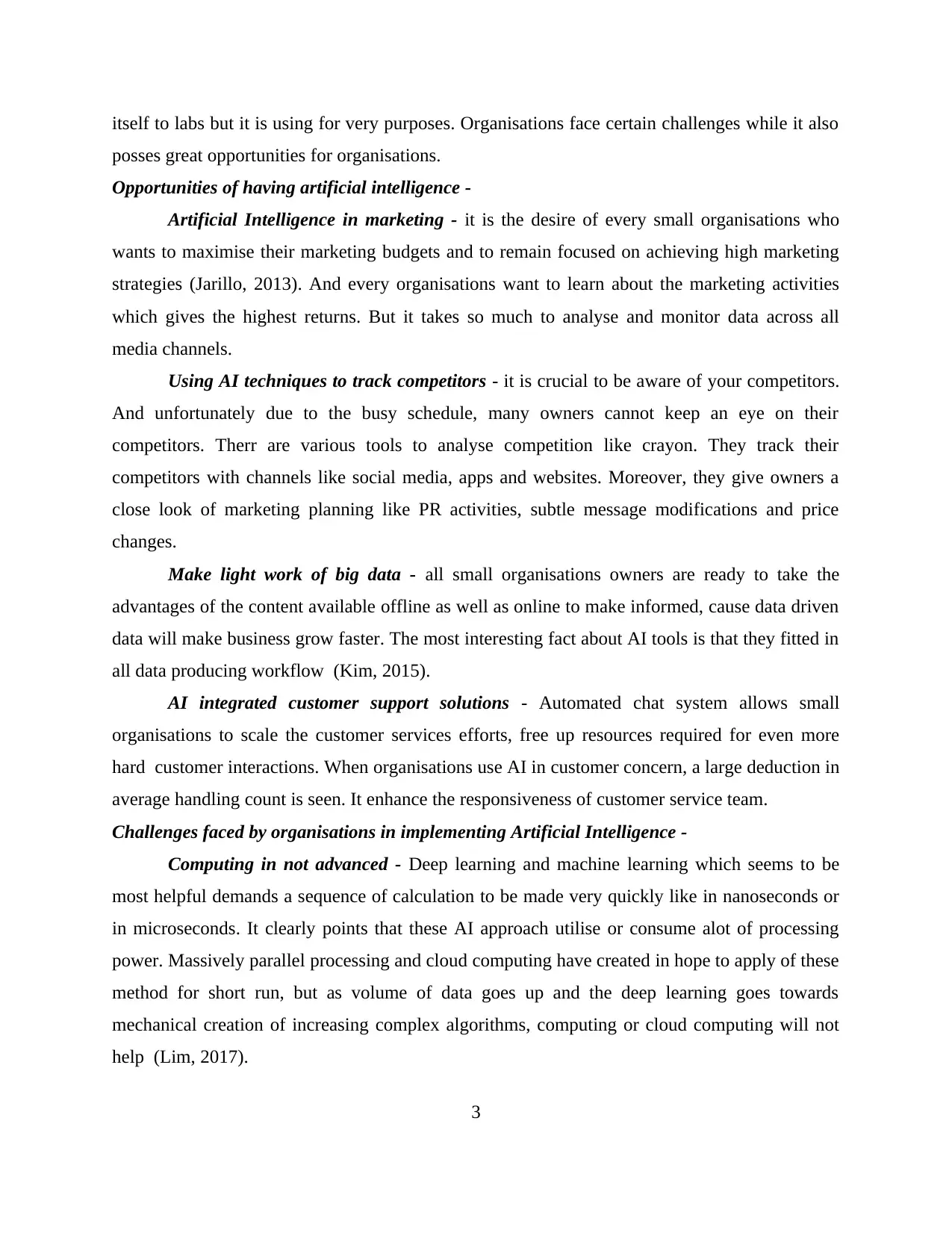
itself to labs but it is using for very purposes. Organisations face certain challenges while it also
posses great opportunities for organisations.
Opportunities of having artificial intelligence -
Artificial Intelligence in marketing - it is the desire of every small organisations who
wants to maximise their marketing budgets and to remain focused on achieving high marketing
strategies (Jarillo, 2013). And every organisations want to learn about the marketing activities
which gives the highest returns. But it takes so much to analyse and monitor data across all
media channels.
Using AI techniques to track competitors - it is crucial to be aware of your competitors.
And unfortunately due to the busy schedule, many owners cannot keep an eye on their
competitors. Therr are various tools to analyse competition like crayon. They track their
competitors with channels like social media, apps and websites. Moreover, they give owners a
close look of marketing planning like PR activities, subtle message modifications and price
changes.
Make light work of big data - all small organisations owners are ready to take the
advantages of the content available offline as well as online to make informed, cause data driven
data will make business grow faster. The most interesting fact about AI tools is that they fitted in
all data producing workflow (Kim, 2015).
AI integrated customer support solutions - Automated chat system allows small
organisations to scale the customer services efforts, free up resources required for even more
hard customer interactions. When organisations use AI in customer concern, a large deduction in
average handling count is seen. It enhance the responsiveness of customer service team.
Challenges faced by organisations in implementing Artificial Intelligence -
Computing in not advanced - Deep learning and machine learning which seems to be
most helpful demands a sequence of calculation to be made very quickly like in nanoseconds or
in microseconds. It clearly points that these AI approach utilise or consume alot of processing
power. Massively parallel processing and cloud computing have created in hope to apply of these
method for short run, but as volume of data goes up and the deep learning goes towards
mechanical creation of increasing complex algorithms, computing or cloud computing will not
help (Lim, 2017).
3
posses great opportunities for organisations.
Opportunities of having artificial intelligence -
Artificial Intelligence in marketing - it is the desire of every small organisations who
wants to maximise their marketing budgets and to remain focused on achieving high marketing
strategies (Jarillo, 2013). And every organisations want to learn about the marketing activities
which gives the highest returns. But it takes so much to analyse and monitor data across all
media channels.
Using AI techniques to track competitors - it is crucial to be aware of your competitors.
And unfortunately due to the busy schedule, many owners cannot keep an eye on their
competitors. Therr are various tools to analyse competition like crayon. They track their
competitors with channels like social media, apps and websites. Moreover, they give owners a
close look of marketing planning like PR activities, subtle message modifications and price
changes.
Make light work of big data - all small organisations owners are ready to take the
advantages of the content available offline as well as online to make informed, cause data driven
data will make business grow faster. The most interesting fact about AI tools is that they fitted in
all data producing workflow (Kim, 2015).
AI integrated customer support solutions - Automated chat system allows small
organisations to scale the customer services efforts, free up resources required for even more
hard customer interactions. When organisations use AI in customer concern, a large deduction in
average handling count is seen. It enhance the responsiveness of customer service team.
Challenges faced by organisations in implementing Artificial Intelligence -
Computing in not advanced - Deep learning and machine learning which seems to be
most helpful demands a sequence of calculation to be made very quickly like in nanoseconds or
in microseconds. It clearly points that these AI approach utilise or consume alot of processing
power. Massively parallel processing and cloud computing have created in hope to apply of these
method for short run, but as volume of data goes up and the deep learning goes towards
mechanical creation of increasing complex algorithms, computing or cloud computing will not
help (Lim, 2017).
3
⊘ This is a preview!⊘
Do you want full access?
Subscribe today to unlock all pages.

Trusted by 1+ million students worldwide
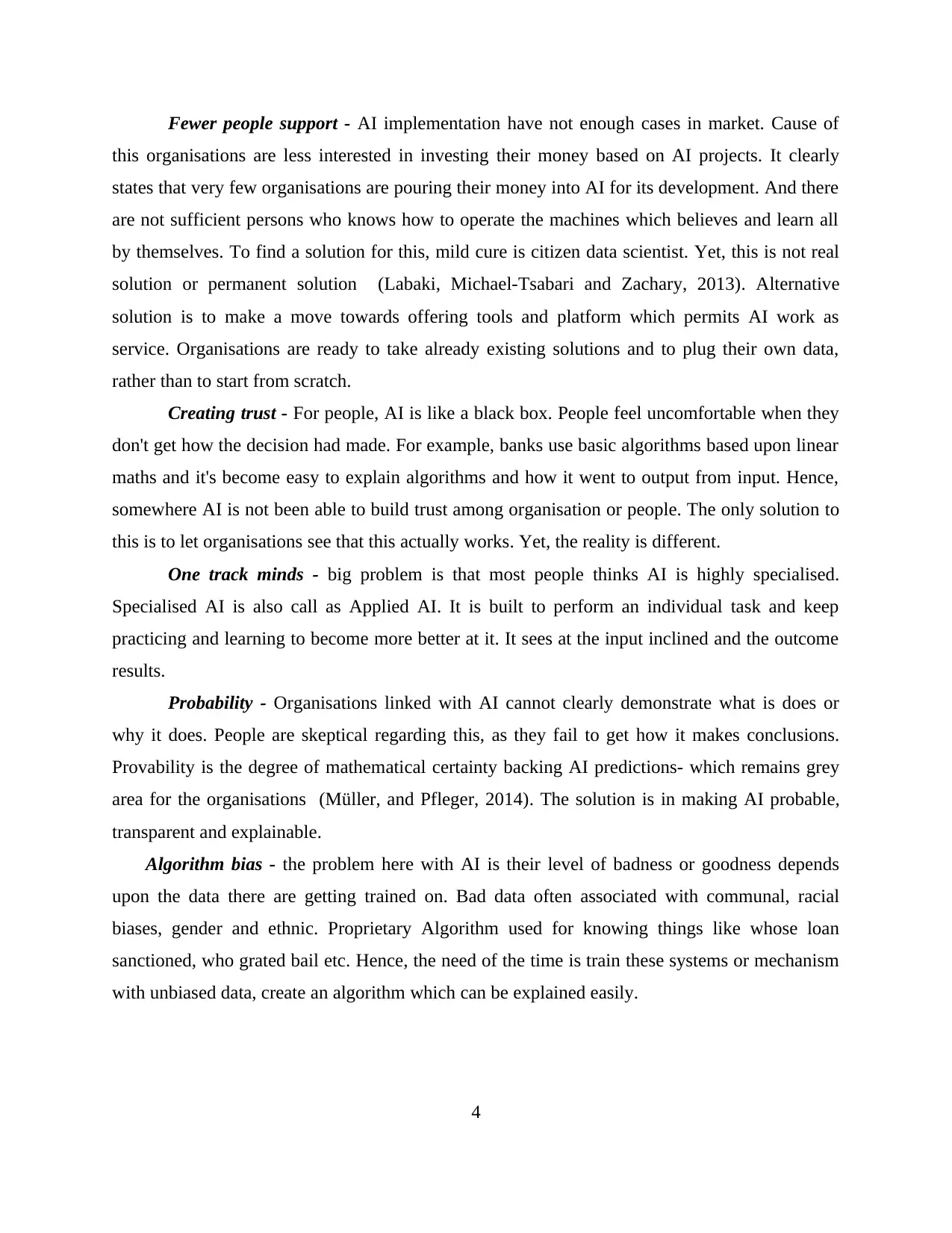
Fewer people support - AI implementation have not enough cases in market. Cause of
this organisations are less interested in investing their money based on AI projects. It clearly
states that very few organisations are pouring their money into AI for its development. And there
are not sufficient persons who knows how to operate the machines which believes and learn all
by themselves. To find a solution for this, mild cure is citizen data scientist. Yet, this is not real
solution or permanent solution (Labaki, Michael-Tsabari and Zachary, 2013). Alternative
solution is to make a move towards offering tools and platform which permits AI work as
service. Organisations are ready to take already existing solutions and to plug their own data,
rather than to start from scratch.
Creating trust - For people, AI is like a black box. People feel uncomfortable when they
don't get how the decision had made. For example, banks use basic algorithms based upon linear
maths and it's become easy to explain algorithms and how it went to output from input. Hence,
somewhere AI is not been able to build trust among organisation or people. The only solution to
this is to let organisations see that this actually works. Yet, the reality is different.
One track minds - big problem is that most people thinks AI is highly specialised.
Specialised AI is also call as Applied AI. It is built to perform an individual task and keep
practicing and learning to become more better at it. It sees at the input inclined and the outcome
results.
Probability - Organisations linked with AI cannot clearly demonstrate what is does or
why it does. People are skeptical regarding this, as they fail to get how it makes conclusions.
Provability is the degree of mathematical certainty backing AI predictions- which remains grey
area for the organisations (Müller, and Pfleger, 2014). The solution is in making AI probable,
transparent and explainable.
Algorithm bias - the problem here with AI is their level of badness or goodness depends
upon the data there are getting trained on. Bad data often associated with communal, racial
biases, gender and ethnic. Proprietary Algorithm used for knowing things like whose loan
sanctioned, who grated bail etc. Hence, the need of the time is train these systems or mechanism
with unbiased data, create an algorithm which can be explained easily.
4
this organisations are less interested in investing their money based on AI projects. It clearly
states that very few organisations are pouring their money into AI for its development. And there
are not sufficient persons who knows how to operate the machines which believes and learn all
by themselves. To find a solution for this, mild cure is citizen data scientist. Yet, this is not real
solution or permanent solution (Labaki, Michael-Tsabari and Zachary, 2013). Alternative
solution is to make a move towards offering tools and platform which permits AI work as
service. Organisations are ready to take already existing solutions and to plug their own data,
rather than to start from scratch.
Creating trust - For people, AI is like a black box. People feel uncomfortable when they
don't get how the decision had made. For example, banks use basic algorithms based upon linear
maths and it's become easy to explain algorithms and how it went to output from input. Hence,
somewhere AI is not been able to build trust among organisation or people. The only solution to
this is to let organisations see that this actually works. Yet, the reality is different.
One track minds - big problem is that most people thinks AI is highly specialised.
Specialised AI is also call as Applied AI. It is built to perform an individual task and keep
practicing and learning to become more better at it. It sees at the input inclined and the outcome
results.
Probability - Organisations linked with AI cannot clearly demonstrate what is does or
why it does. People are skeptical regarding this, as they fail to get how it makes conclusions.
Provability is the degree of mathematical certainty backing AI predictions- which remains grey
area for the organisations (Müller, and Pfleger, 2014). The solution is in making AI probable,
transparent and explainable.
Algorithm bias - the problem here with AI is their level of badness or goodness depends
upon the data there are getting trained on. Bad data often associated with communal, racial
biases, gender and ethnic. Proprietary Algorithm used for knowing things like whose loan
sanctioned, who grated bail etc. Hence, the need of the time is train these systems or mechanism
with unbiased data, create an algorithm which can be explained easily.
4
Paraphrase This Document
Need a fresh take? Get an instant paraphrase of this document with our AI Paraphraser
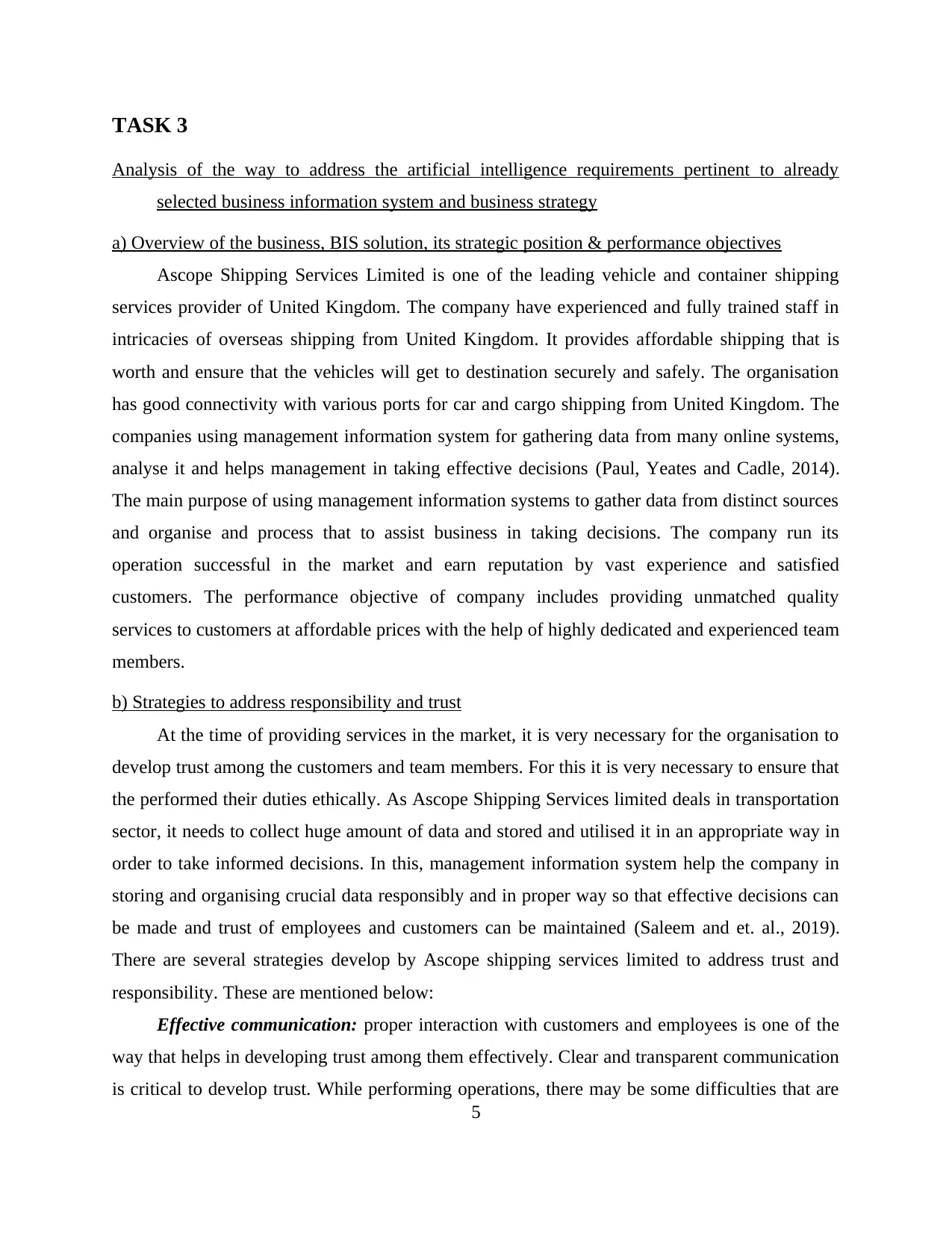
TASK 3
Analysis of the way to address the artificial intelligence requirements pertinent to already
selected business information system and business strategy
a) Overview of the business, BIS solution, its strategic position & performance objectives
Ascope Shipping Services Limited is one of the leading vehicle and container shipping
services provider of United Kingdom. The company have experienced and fully trained staff in
intricacies of overseas shipping from United Kingdom. It provides affordable shipping that is
worth and ensure that the vehicles will get to destination securely and safely. The organisation
has good connectivity with various ports for car and cargo shipping from United Kingdom. The
companies using management information system for gathering data from many online systems,
analyse it and helps management in taking effective decisions (Paul, Yeates and Cadle, 2014).
The main purpose of using management information systems to gather data from distinct sources
and organise and process that to assist business in taking decisions. The company run its
operation successful in the market and earn reputation by vast experience and satisfied
customers. The performance objective of company includes providing unmatched quality
services to customers at affordable prices with the help of highly dedicated and experienced team
members.
b) Strategies to address responsibility and trust
At the time of providing services in the market, it is very necessary for the organisation to
develop trust among the customers and team members. For this it is very necessary to ensure that
the performed their duties ethically. As Ascope Shipping Services limited deals in transportation
sector, it needs to collect huge amount of data and stored and utilised it in an appropriate way in
order to take informed decisions. In this, management information system help the company in
storing and organising crucial data responsibly and in proper way so that effective decisions can
be made and trust of employees and customers can be maintained (Saleem and et. al., 2019).
There are several strategies develop by Ascope shipping services limited to address trust and
responsibility. These are mentioned below:
Effective communication: proper interaction with customers and employees is one of the
way that helps in developing trust among them effectively. Clear and transparent communication
is critical to develop trust. While performing operations, there may be some difficulties that are
5
Analysis of the way to address the artificial intelligence requirements pertinent to already
selected business information system and business strategy
a) Overview of the business, BIS solution, its strategic position & performance objectives
Ascope Shipping Services Limited is one of the leading vehicle and container shipping
services provider of United Kingdom. The company have experienced and fully trained staff in
intricacies of overseas shipping from United Kingdom. It provides affordable shipping that is
worth and ensure that the vehicles will get to destination securely and safely. The organisation
has good connectivity with various ports for car and cargo shipping from United Kingdom. The
companies using management information system for gathering data from many online systems,
analyse it and helps management in taking effective decisions (Paul, Yeates and Cadle, 2014).
The main purpose of using management information systems to gather data from distinct sources
and organise and process that to assist business in taking decisions. The company run its
operation successful in the market and earn reputation by vast experience and satisfied
customers. The performance objective of company includes providing unmatched quality
services to customers at affordable prices with the help of highly dedicated and experienced team
members.
b) Strategies to address responsibility and trust
At the time of providing services in the market, it is very necessary for the organisation to
develop trust among the customers and team members. For this it is very necessary to ensure that
the performed their duties ethically. As Ascope Shipping Services limited deals in transportation
sector, it needs to collect huge amount of data and stored and utilised it in an appropriate way in
order to take informed decisions. In this, management information system help the company in
storing and organising crucial data responsibly and in proper way so that effective decisions can
be made and trust of employees and customers can be maintained (Saleem and et. al., 2019).
There are several strategies develop by Ascope shipping services limited to address trust and
responsibility. These are mentioned below:
Effective communication: proper interaction with customers and employees is one of the
way that helps in developing trust among them effectively. Clear and transparent communication
is critical to develop trust. While performing operations, there may be some difficulties that are
5
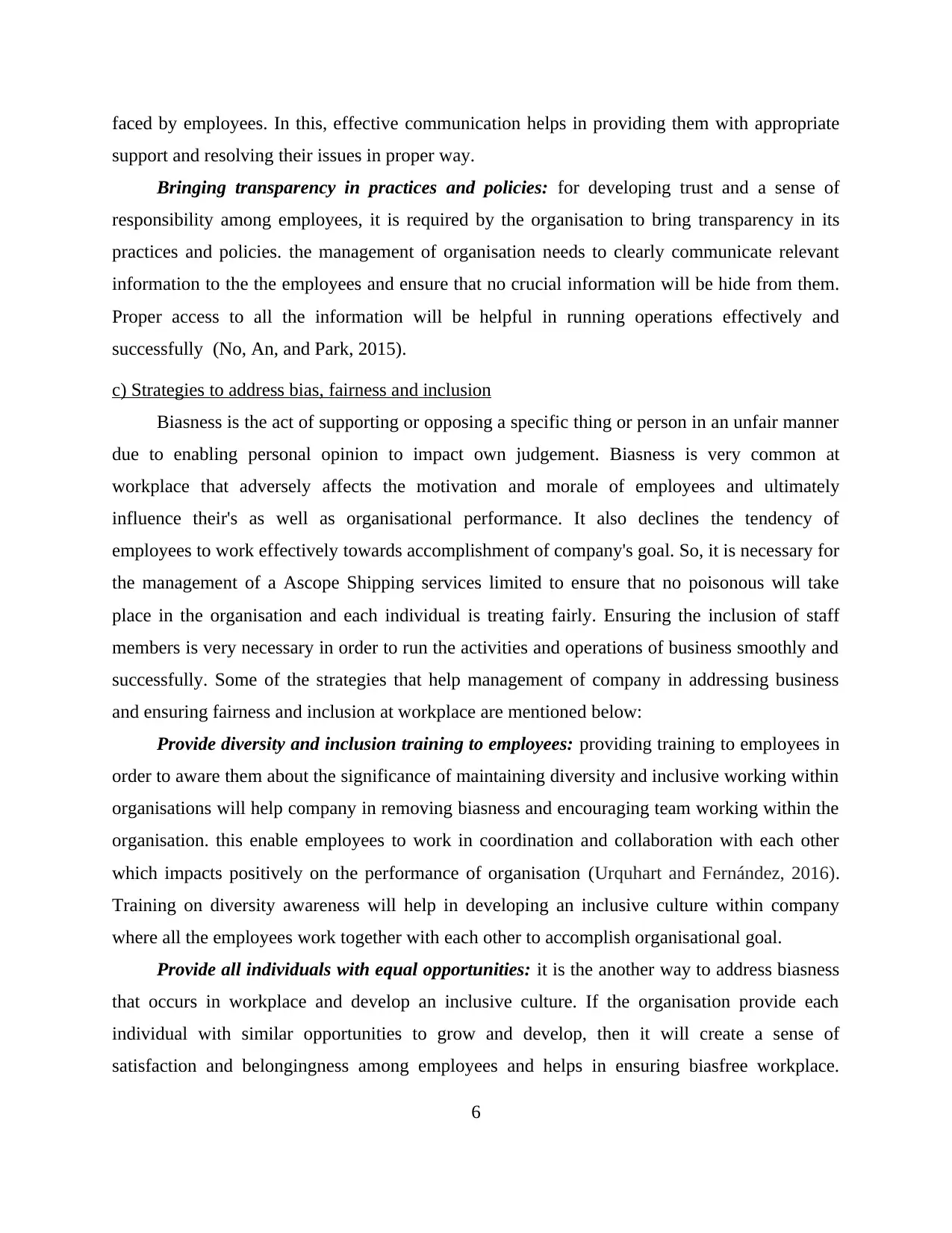
faced by employees. In this, effective communication helps in providing them with appropriate
support and resolving their issues in proper way.
Bringing transparency in practices and policies: for developing trust and a sense of
responsibility among employees, it is required by the organisation to bring transparency in its
practices and policies. the management of organisation needs to clearly communicate relevant
information to the the employees and ensure that no crucial information will be hide from them.
Proper access to all the information will be helpful in running operations effectively and
successfully (No, An, and Park, 2015).
c) Strategies to address bias, fairness and inclusion
Biasness is the act of supporting or opposing a specific thing or person in an unfair manner
due to enabling personal opinion to impact own judgement. Biasness is very common at
workplace that adversely affects the motivation and morale of employees and ultimately
influence their's as well as organisational performance. It also declines the tendency of
employees to work effectively towards accomplishment of company's goal. So, it is necessary for
the management of a Ascope Shipping services limited to ensure that no poisonous will take
place in the organisation and each individual is treating fairly. Ensuring the inclusion of staff
members is very necessary in order to run the activities and operations of business smoothly and
successfully. Some of the strategies that help management of company in addressing business
and ensuring fairness and inclusion at workplace are mentioned below:
Provide diversity and inclusion training to employees: providing training to employees in
order to aware them about the significance of maintaining diversity and inclusive working within
organisations will help company in removing biasness and encouraging team working within the
organisation. this enable employees to work in coordination and collaboration with each other
which impacts positively on the performance of organisation (Urquhart and Fernández, 2016).
Training on diversity awareness will help in developing an inclusive culture within company
where all the employees work together with each other to accomplish organisational goal.
Provide all individuals with equal opportunities: it is the another way to address biasness
that occurs in workplace and develop an inclusive culture. If the organisation provide each
individual with similar opportunities to grow and develop, then it will create a sense of
satisfaction and belongingness among employees and helps in ensuring biasfree workplace.
6
support and resolving their issues in proper way.
Bringing transparency in practices and policies: for developing trust and a sense of
responsibility among employees, it is required by the organisation to bring transparency in its
practices and policies. the management of organisation needs to clearly communicate relevant
information to the the employees and ensure that no crucial information will be hide from them.
Proper access to all the information will be helpful in running operations effectively and
successfully (No, An, and Park, 2015).
c) Strategies to address bias, fairness and inclusion
Biasness is the act of supporting or opposing a specific thing or person in an unfair manner
due to enabling personal opinion to impact own judgement. Biasness is very common at
workplace that adversely affects the motivation and morale of employees and ultimately
influence their's as well as organisational performance. It also declines the tendency of
employees to work effectively towards accomplishment of company's goal. So, it is necessary for
the management of a Ascope Shipping services limited to ensure that no poisonous will take
place in the organisation and each individual is treating fairly. Ensuring the inclusion of staff
members is very necessary in order to run the activities and operations of business smoothly and
successfully. Some of the strategies that help management of company in addressing business
and ensuring fairness and inclusion at workplace are mentioned below:
Provide diversity and inclusion training to employees: providing training to employees in
order to aware them about the significance of maintaining diversity and inclusive working within
organisations will help company in removing biasness and encouraging team working within the
organisation. this enable employees to work in coordination and collaboration with each other
which impacts positively on the performance of organisation (Urquhart and Fernández, 2016).
Training on diversity awareness will help in developing an inclusive culture within company
where all the employees work together with each other to accomplish organisational goal.
Provide all individuals with equal opportunities: it is the another way to address biasness
that occurs in workplace and develop an inclusive culture. If the organisation provide each
individual with similar opportunities to grow and develop, then it will create a sense of
satisfaction and belongingness among employees and helps in ensuring biasfree workplace.
6
⊘ This is a preview!⊘
Do you want full access?
Subscribe today to unlock all pages.

Trusted by 1+ million students worldwide
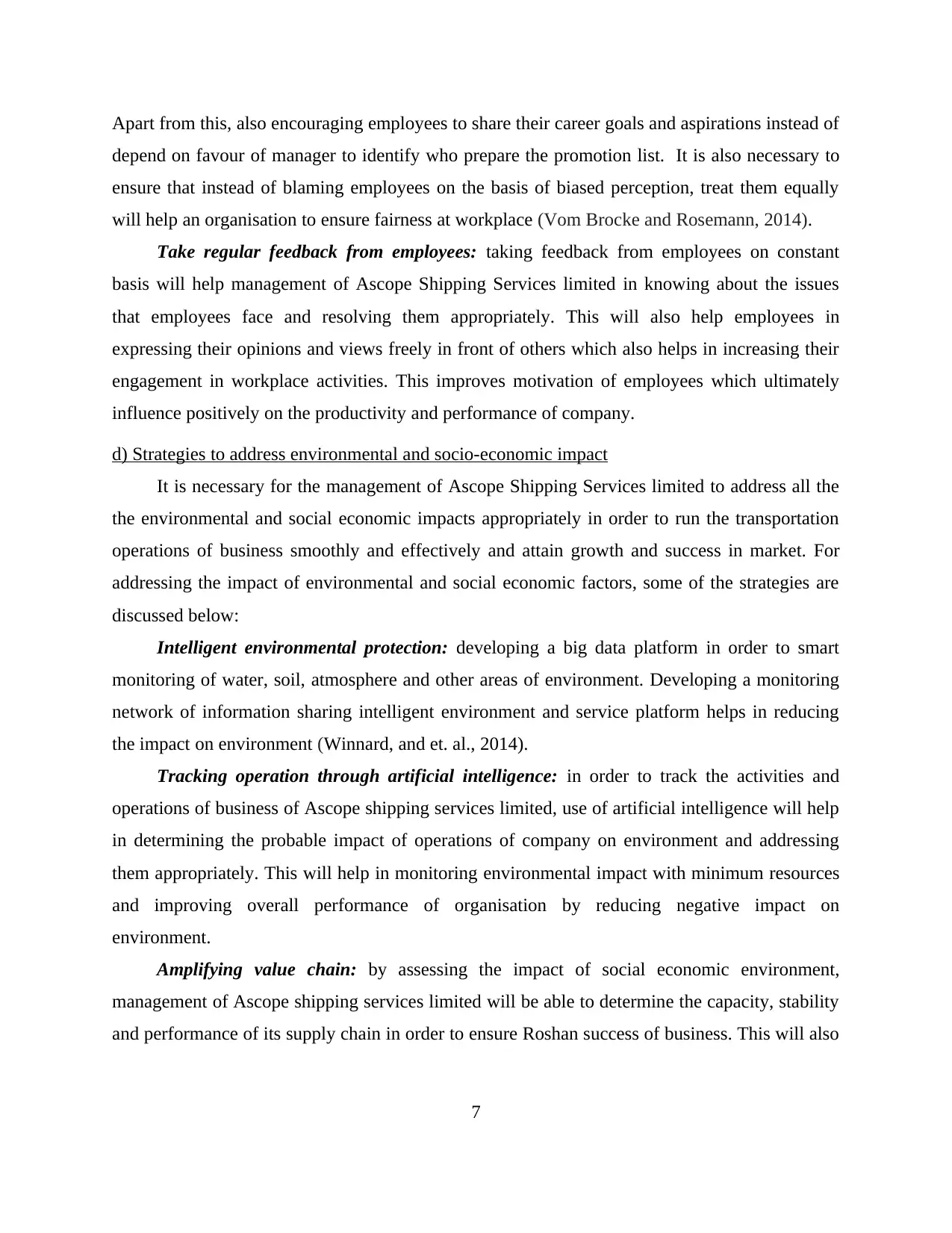
Apart from this, also encouraging employees to share their career goals and aspirations instead of
depend on favour of manager to identify who prepare the promotion list. It is also necessary to
ensure that instead of blaming employees on the basis of biased perception, treat them equally
will help an organisation to ensure fairness at workplace (Vom Brocke and Rosemann, 2014).
Take regular feedback from employees: taking feedback from employees on constant
basis will help management of Ascope Shipping Services limited in knowing about the issues
that employees face and resolving them appropriately. This will also help employees in
expressing their opinions and views freely in front of others which also helps in increasing their
engagement in workplace activities. This improves motivation of employees which ultimately
influence positively on the productivity and performance of company.
d) Strategies to address environmental and socio-economic impact
It is necessary for the management of Ascope Shipping Services limited to address all the
the environmental and social economic impacts appropriately in order to run the transportation
operations of business smoothly and effectively and attain growth and success in market. For
addressing the impact of environmental and social economic factors, some of the strategies are
discussed below:
Intelligent environmental protection: developing a big data platform in order to smart
monitoring of water, soil, atmosphere and other areas of environment. Developing a monitoring
network of information sharing intelligent environment and service platform helps in reducing
the impact on environment (Winnard, and et. al., 2014).
Tracking operation through artificial intelligence: in order to track the activities and
operations of business of Ascope shipping services limited, use of artificial intelligence will help
in determining the probable impact of operations of company on environment and addressing
them appropriately. This will help in monitoring environmental impact with minimum resources
and improving overall performance of organisation by reducing negative impact on
environment.
Amplifying value chain: by assessing the impact of social economic environment,
management of Ascope shipping services limited will be able to determine the capacity, stability
and performance of its supply chain in order to ensure Roshan success of business. This will also
7
depend on favour of manager to identify who prepare the promotion list. It is also necessary to
ensure that instead of blaming employees on the basis of biased perception, treat them equally
will help an organisation to ensure fairness at workplace (Vom Brocke and Rosemann, 2014).
Take regular feedback from employees: taking feedback from employees on constant
basis will help management of Ascope Shipping Services limited in knowing about the issues
that employees face and resolving them appropriately. This will also help employees in
expressing their opinions and views freely in front of others which also helps in increasing their
engagement in workplace activities. This improves motivation of employees which ultimately
influence positively on the productivity and performance of company.
d) Strategies to address environmental and socio-economic impact
It is necessary for the management of Ascope Shipping Services limited to address all the
the environmental and social economic impacts appropriately in order to run the transportation
operations of business smoothly and effectively and attain growth and success in market. For
addressing the impact of environmental and social economic factors, some of the strategies are
discussed below:
Intelligent environmental protection: developing a big data platform in order to smart
monitoring of water, soil, atmosphere and other areas of environment. Developing a monitoring
network of information sharing intelligent environment and service platform helps in reducing
the impact on environment (Winnard, and et. al., 2014).
Tracking operation through artificial intelligence: in order to track the activities and
operations of business of Ascope shipping services limited, use of artificial intelligence will help
in determining the probable impact of operations of company on environment and addressing
them appropriately. This will help in monitoring environmental impact with minimum resources
and improving overall performance of organisation by reducing negative impact on
environment.
Amplifying value chain: by assessing the impact of social economic environment,
management of Ascope shipping services limited will be able to determine the capacity, stability
and performance of its supply chain in order to ensure Roshan success of business. This will also
7
Paraphrase This Document
Need a fresh take? Get an instant paraphrase of this document with our AI Paraphraser
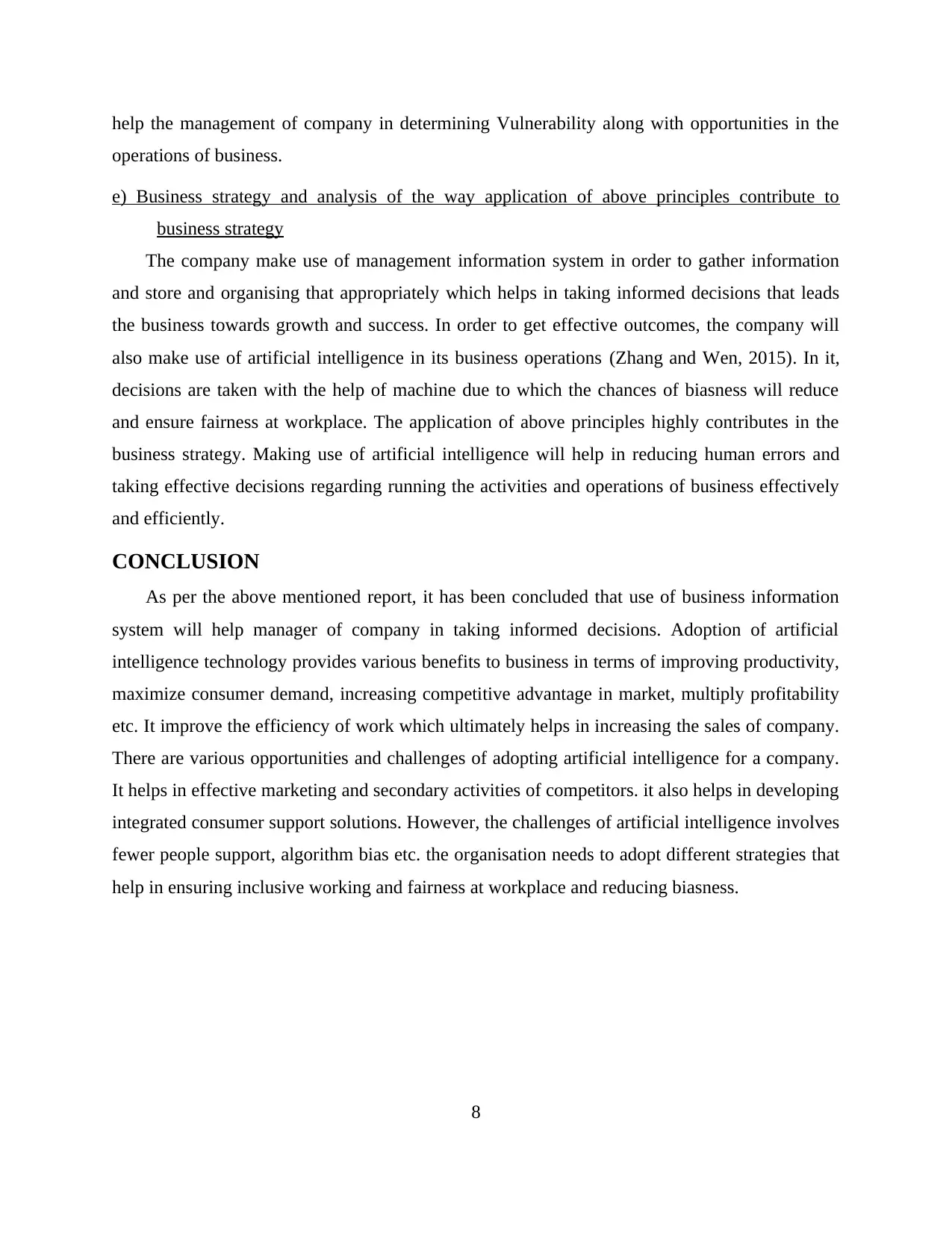
help the management of company in determining Vulnerability along with opportunities in the
operations of business.
e) Business strategy and analysis of the way application of above principles contribute to
business strategy
The company make use of management information system in order to gather information
and store and organising that appropriately which helps in taking informed decisions that leads
the business towards growth and success. In order to get effective outcomes, the company will
also make use of artificial intelligence in its business operations (Zhang and Wen, 2015). In it,
decisions are taken with the help of machine due to which the chances of biasness will reduce
and ensure fairness at workplace. The application of above principles highly contributes in the
business strategy. Making use of artificial intelligence will help in reducing human errors and
taking effective decisions regarding running the activities and operations of business effectively
and efficiently.
CONCLUSION
As per the above mentioned report, it has been concluded that use of business information
system will help manager of company in taking informed decisions. Adoption of artificial
intelligence technology provides various benefits to business in terms of improving productivity,
maximize consumer demand, increasing competitive advantage in market, multiply profitability
etc. It improve the efficiency of work which ultimately helps in increasing the sales of company.
There are various opportunities and challenges of adopting artificial intelligence for a company.
It helps in effective marketing and secondary activities of competitors. it also helps in developing
integrated consumer support solutions. However, the challenges of artificial intelligence involves
fewer people support, algorithm bias etc. the organisation needs to adopt different strategies that
help in ensuring inclusive working and fairness at workplace and reducing biasness.
8
operations of business.
e) Business strategy and analysis of the way application of above principles contribute to
business strategy
The company make use of management information system in order to gather information
and store and organising that appropriately which helps in taking informed decisions that leads
the business towards growth and success. In order to get effective outcomes, the company will
also make use of artificial intelligence in its business operations (Zhang and Wen, 2015). In it,
decisions are taken with the help of machine due to which the chances of biasness will reduce
and ensure fairness at workplace. The application of above principles highly contributes in the
business strategy. Making use of artificial intelligence will help in reducing human errors and
taking effective decisions regarding running the activities and operations of business effectively
and efficiently.
CONCLUSION
As per the above mentioned report, it has been concluded that use of business information
system will help manager of company in taking informed decisions. Adoption of artificial
intelligence technology provides various benefits to business in terms of improving productivity,
maximize consumer demand, increasing competitive advantage in market, multiply profitability
etc. It improve the efficiency of work which ultimately helps in increasing the sales of company.
There are various opportunities and challenges of adopting artificial intelligence for a company.
It helps in effective marketing and secondary activities of competitors. it also helps in developing
integrated consumer support solutions. However, the challenges of artificial intelligence involves
fewer people support, algorithm bias etc. the organisation needs to adopt different strategies that
help in ensuring inclusive working and fairness at workplace and reducing biasness.
8
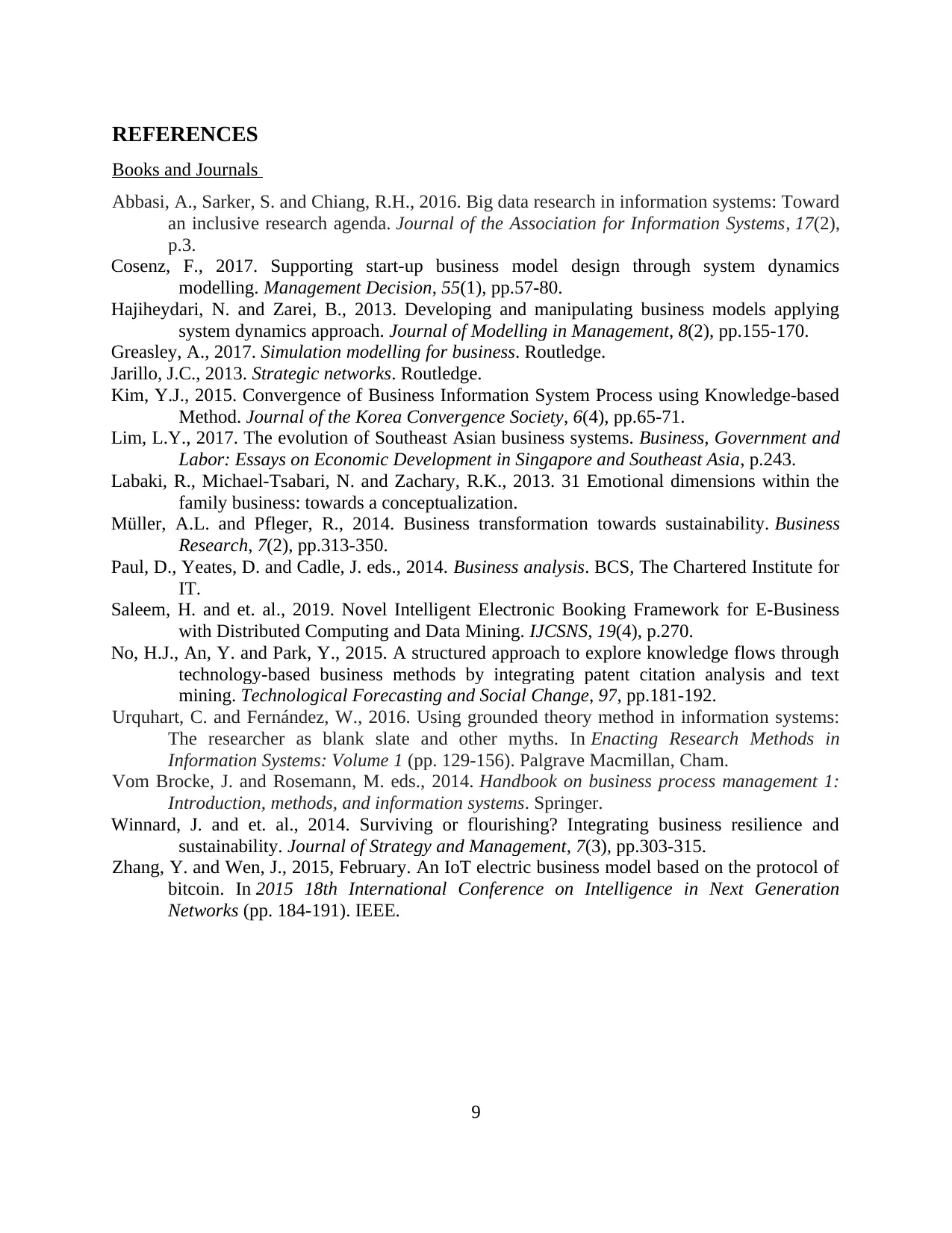
REFERENCES
Books and Journals
Abbasi, A., Sarker, S. and Chiang, R.H., 2016. Big data research in information systems: Toward
an inclusive research agenda. Journal of the Association for Information Systems, 17(2),
p.3.
Cosenz, F., 2017. Supporting start-up business model design through system dynamics
modelling. Management Decision, 55(1), pp.57-80.
Hajiheydari, N. and Zarei, B., 2013. Developing and manipulating business models applying
system dynamics approach. Journal of Modelling in Management, 8(2), pp.155-170.
Greasley, A., 2017. Simulation modelling for business. Routledge.
Jarillo, J.C., 2013. Strategic networks. Routledge.
Kim, Y.J., 2015. Convergence of Business Information System Process using Knowledge-based
Method. Journal of the Korea Convergence Society, 6(4), pp.65-71.
Lim, L.Y., 2017. The evolution of Southeast Asian business systems. Business, Government and
Labor: Essays on Economic Development in Singapore and Southeast Asia, p.243.
Labaki, R., Michael-Tsabari, N. and Zachary, R.K., 2013. 31 Emotional dimensions within the
family business: towards a conceptualization.
Müller, A.L. and Pfleger, R., 2014. Business transformation towards sustainability. Business
Research, 7(2), pp.313-350.
Paul, D., Yeates, D. and Cadle, J. eds., 2014. Business analysis. BCS, The Chartered Institute for
IT.
Saleem, H. and et. al., 2019. Novel Intelligent Electronic Booking Framework for E-Business
with Distributed Computing and Data Mining. IJCSNS, 19(4), p.270.
No, H.J., An, Y. and Park, Y., 2015. A structured approach to explore knowledge flows through
technology-based business methods by integrating patent citation analysis and text
mining. Technological Forecasting and Social Change, 97, pp.181-192.
Urquhart, C. and Fernández, W., 2016. Using grounded theory method in information systems:
The researcher as blank slate and other myths. In Enacting Research Methods in
Information Systems: Volume 1 (pp. 129-156). Palgrave Macmillan, Cham.
Vom Brocke, J. and Rosemann, M. eds., 2014. Handbook on business process management 1:
Introduction, methods, and information systems. Springer.
Winnard, J. and et. al., 2014. Surviving or flourishing? Integrating business resilience and
sustainability. Journal of Strategy and Management, 7(3), pp.303-315.
Zhang, Y. and Wen, J., 2015, February. An IoT electric business model based on the protocol of
bitcoin. In 2015 18th International Conference on Intelligence in Next Generation
Networks (pp. 184-191). IEEE.
9
Books and Journals
Abbasi, A., Sarker, S. and Chiang, R.H., 2016. Big data research in information systems: Toward
an inclusive research agenda. Journal of the Association for Information Systems, 17(2),
p.3.
Cosenz, F., 2017. Supporting start-up business model design through system dynamics
modelling. Management Decision, 55(1), pp.57-80.
Hajiheydari, N. and Zarei, B., 2013. Developing and manipulating business models applying
system dynamics approach. Journal of Modelling in Management, 8(2), pp.155-170.
Greasley, A., 2017. Simulation modelling for business. Routledge.
Jarillo, J.C., 2013. Strategic networks. Routledge.
Kim, Y.J., 2015. Convergence of Business Information System Process using Knowledge-based
Method. Journal of the Korea Convergence Society, 6(4), pp.65-71.
Lim, L.Y., 2017. The evolution of Southeast Asian business systems. Business, Government and
Labor: Essays on Economic Development in Singapore and Southeast Asia, p.243.
Labaki, R., Michael-Tsabari, N. and Zachary, R.K., 2013. 31 Emotional dimensions within the
family business: towards a conceptualization.
Müller, A.L. and Pfleger, R., 2014. Business transformation towards sustainability. Business
Research, 7(2), pp.313-350.
Paul, D., Yeates, D. and Cadle, J. eds., 2014. Business analysis. BCS, The Chartered Institute for
IT.
Saleem, H. and et. al., 2019. Novel Intelligent Electronic Booking Framework for E-Business
with Distributed Computing and Data Mining. IJCSNS, 19(4), p.270.
No, H.J., An, Y. and Park, Y., 2015. A structured approach to explore knowledge flows through
technology-based business methods by integrating patent citation analysis and text
mining. Technological Forecasting and Social Change, 97, pp.181-192.
Urquhart, C. and Fernández, W., 2016. Using grounded theory method in information systems:
The researcher as blank slate and other myths. In Enacting Research Methods in
Information Systems: Volume 1 (pp. 129-156). Palgrave Macmillan, Cham.
Vom Brocke, J. and Rosemann, M. eds., 2014. Handbook on business process management 1:
Introduction, methods, and information systems. Springer.
Winnard, J. and et. al., 2014. Surviving or flourishing? Integrating business resilience and
sustainability. Journal of Strategy and Management, 7(3), pp.303-315.
Zhang, Y. and Wen, J., 2015, February. An IoT electric business model based on the protocol of
bitcoin. In 2015 18th International Conference on Intelligence in Next Generation
Networks (pp. 184-191). IEEE.
9
⊘ This is a preview!⊘
Do you want full access?
Subscribe today to unlock all pages.

Trusted by 1+ million students worldwide
1 out of 12
Related Documents
Your All-in-One AI-Powered Toolkit for Academic Success.
+13062052269
info@desklib.com
Available 24*7 on WhatsApp / Email
![[object Object]](/_next/static/media/star-bottom.7253800d.svg)
Unlock your academic potential
Copyright © 2020–2026 A2Z Services. All Rights Reserved. Developed and managed by ZUCOL.





